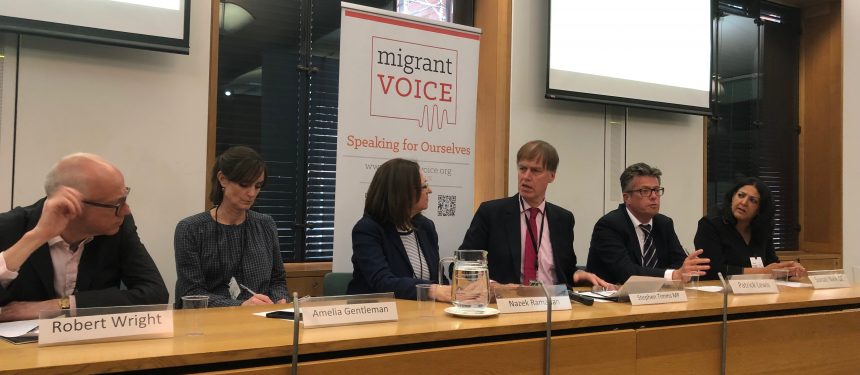A powerful documentary exposing the devastating impact of the Home Office decision to revoke thousands of international students’ visas after the TOEIC cheating scandal in 2014 has been launched and screened in central London.
News and business analysis for Professionals in International Education
Have some pie!
Documentary on TOEIC case launched in Westminster
 The panel discussion after the screening of the documentary.
The panel discussion after the screening of the documentary. This is the latest step in a campaign led by charity Migrant Voice to allow those students to sit a new English test and clear their name of cheating allegations.
“I was so affected by the students’ stories, it made me really angry,” said film maker Tim Langford, who created the documentary for Migrant Voice.
“The more I heard, the more I was shocked and disturbed”
Titled “Inquisition,” the documentary focuses on five of the international students affected, whose mental health, finances, and life prospects have been put in jeopardy by the loss of their visas, periods of detention or years of legal battles.
Langford said he got involved at first to help out at a media training session run by Migrant Voice, and then decided to make a documentary after speaking to some of the students.
“The more I heard, the more I was shocked and disturbed,” he added.
“I absolutely believe the students. All the evidence is on their side. And I feel very strongly they came in with absolute belief and faith in our system, and we let them down really badly as a society.”
Nidhin Chand gave a poignant testimony of her own story in the documentary: while waiting for a visa extension for a PhD, she was arrested. She has since obtained a visa, but the experience has left enduring psychological pain.
“I don’t have a complete closure, but still I have a visa now,” she told The PIE.
“But all these students, these victims, who still don’t have a visa…they don’t have a closure, they can’t see their family, it’s very difficult for them. This is why I came here and I wanted to help out with this movie, because I want to see them stop crying.”
A panel discussion chaired by Stephen Timms MP followed the screening, with panellists including Migrant Voice director Nazek Ramadan, two lawyers representing the students – Patrick Lewis QC and Sonali Naik QC – and journalists Amelia Gentleman and Robert Wright.
Ramadan explained that even for those students who have won their case in court and have been cleared of allegations the problems are not over, as they are given a 60-day window to be accepted in a course.
“The 60 day-visa is almost good for nothing, it’s not enough to find a university. Some of the students we met were given those 60-day visas at a time when universities are not recruiting students,” she told The PIE.
Another issue, she said, is that universities are not taking these students back, because they see them as ‘high risk.’
“I spoke in confidence to a couple of universities. The people working in admission told me this. They see those students as high risk because they no longer fit the criteria, they have been out of education for a long time, they don’t have the money.”
“Universities should play a better role to protect their own students, the reputation of our universities and education system,” added Ramadan.
“They must take these students back and the Home Office must tell universities to have these students back in the same way as it asked them to kick them out.”
“I have a real concern that universities’ compliance officers will take the view that these students are tainted”
A university immigration adviser, who preferred to remain anonymous, echoed Ramadan’s concerns: “I have a real concern that universities’ compliance officers will take the view that these students are tainted, these students have been out of the system, something has gone wrong, “we can’t take the risk of issuing the CAS” [confirmation of acceptance of studies, needed to obtain a Tier 4 visa].”
During the panel discussion, he made the point that the sector could have done more to support the students affected by the TOEIC case.
The screening took place in Portcullis House, Westminster, in the presence of several MPs, journalists, campaigners and representatives of other organisations such as the3million.
Asked to comment on the case, and the difficulties students are having in accessing higher education after their court case, UUK declined to comment at this stage awaiting the report on the NAO investigation into the Home Office handling of the case, which is due to be released soon.
UKCISA chief executive Anne Marie Graham told The PIE: “It is concerning that many international students have suffered stress and reputational damage because of visa cancellations, and we welcome the NAO enquiry. We will also monitor the recommendations from the newly formed APPG on Test of English for International Communication.”
Still looking? Find by category:



This page is helpful. But it has taken from my life nearly 6 years. the home office or court will give this hard life back to me. This consequences has affected my entire family children. Suffered a lot. Still I do have respect for uk sovereignty. Looking forward to hear update.